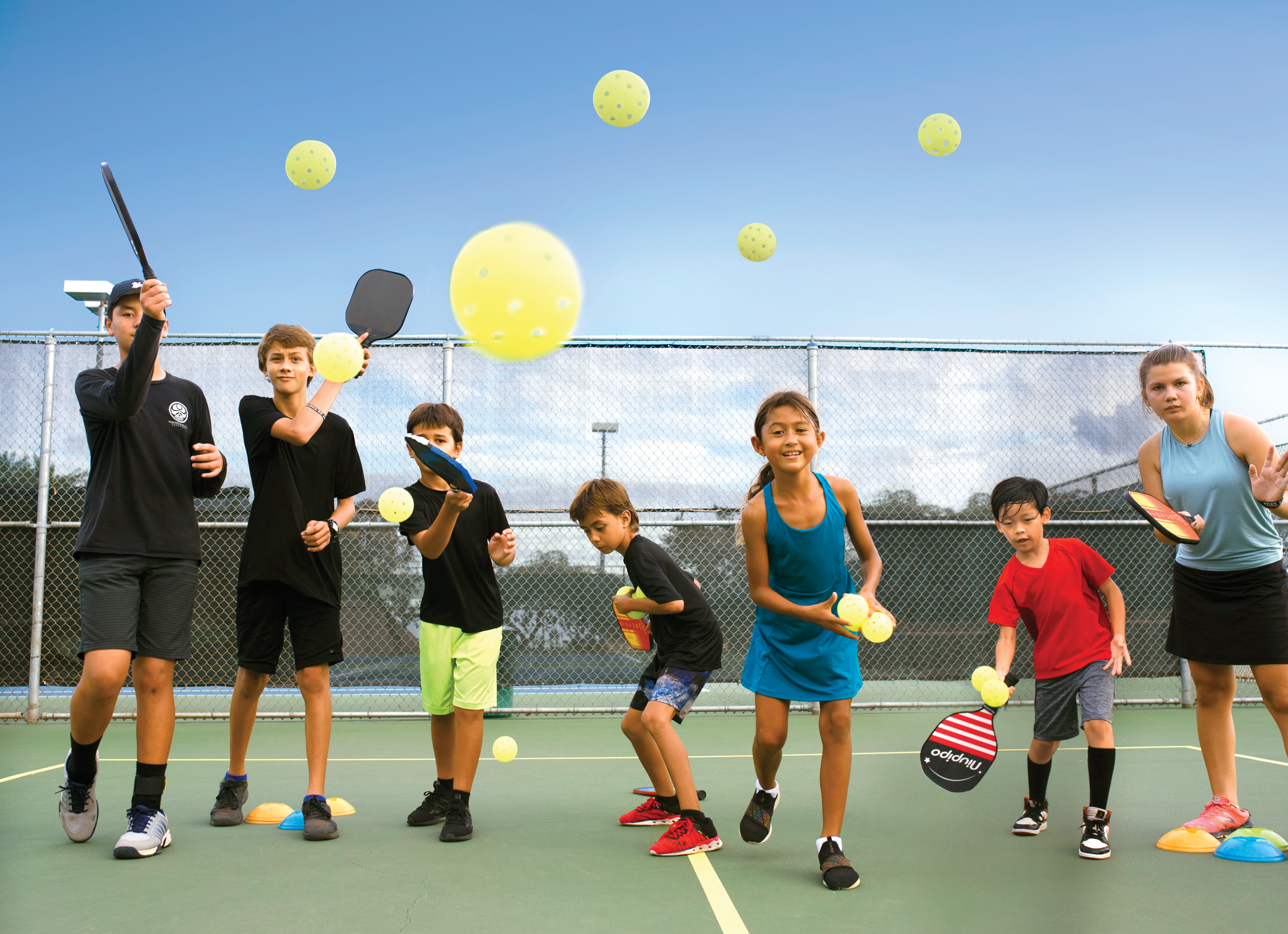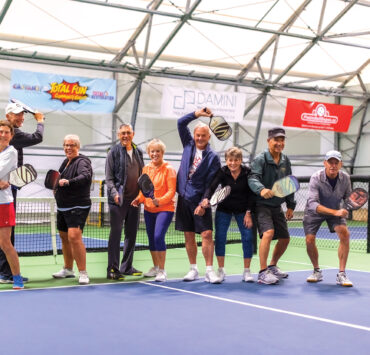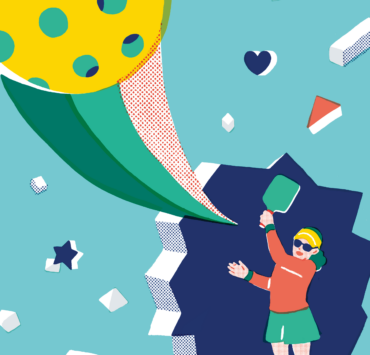When Donna Ching, 58, thinks about pickleball, one word comes to mind: ohana. It is a Hawaiian word that refers to a person’s extended family, which can also include friends and others in one’s social circle. “That is what truly happens on the courts here,” says Ching, founder of the Oahu Pickleball Association, explaining that it is not unusual to have grandparents, parents, and extended intergenerational families come together to play after work or on Sundays. “In Hawaii, pickleball is not a hard sell culturally,” she adds. “It is ohana, which is why people are clinging to it.”
Now, thanks to Ching, the youngest generation in Hawaii is also embracing the sport. “When the kids start playing, there is no stopping them,” she says, speaking from experience. Ching started a youth program on Oahu in 2017 that has already turned nearly 100 kids on to the sport. (Locals write the state’s name Hawai‘i and the island’s O‘ahu.)

For Ching, a USA Pickleball ambassador for Honolulu and USA Pickleball’s West Region community-engagement specialist for California and Hawaii, introducing children and teens to the sport is just one more step in a larger mission. “I would like to see Hawaii become the pickleball state of the nation, or at least a major hub, because it is possible with our year-round weather,” she says. Ching also envisions a Hawaiian full-on junior academy with a “pickle-plex” that would host major events. “Because we are on the Pacific Rim, kids could easily travel here from Japan and China and all the East Asian countries, or the mainland, to learn to compete.”
BUT IT IS HOW SHE sees the sport changing the lives of children that most excites Ching. “The kids here have a spirit that is so infectious and positive and great with pickleball. It comes from growing up with aloha,” Ching says, referring to the Hawaiian greeting for “hello” and “goodbye,” which also conveys love and friendship. “What motivates me is how empowering pickleball is for the kids. It is an equalizer. You don’t need a ton of coordination or instruction. It also gets them outside, active, and having fun.”
Like many pickleball enthusiasts, Ching is still relatively new to the sport. A tennis player with decades-long experience, she first saw pickleball being played in November 2016 in Surprise, Arizona, where she was competing in a United States Tennis Association women’s tournament. “I suddenly saw people playing it out of the corner of my eye,” she says, adding that she also heard the sound of balls hitting paddles. (Next door to the tennis complex where Ching was playing are 16 public pickleball courts.) “I thought, Now, that looks interesting.”
For Donna Ching, introducing children and teens to the sport is just part of the mission.
Though she wanted to pick up a paddle that day, she promised her tennis-team captain she would wait until after the tournament. The minute it ended, she jumped on a court with her husband.
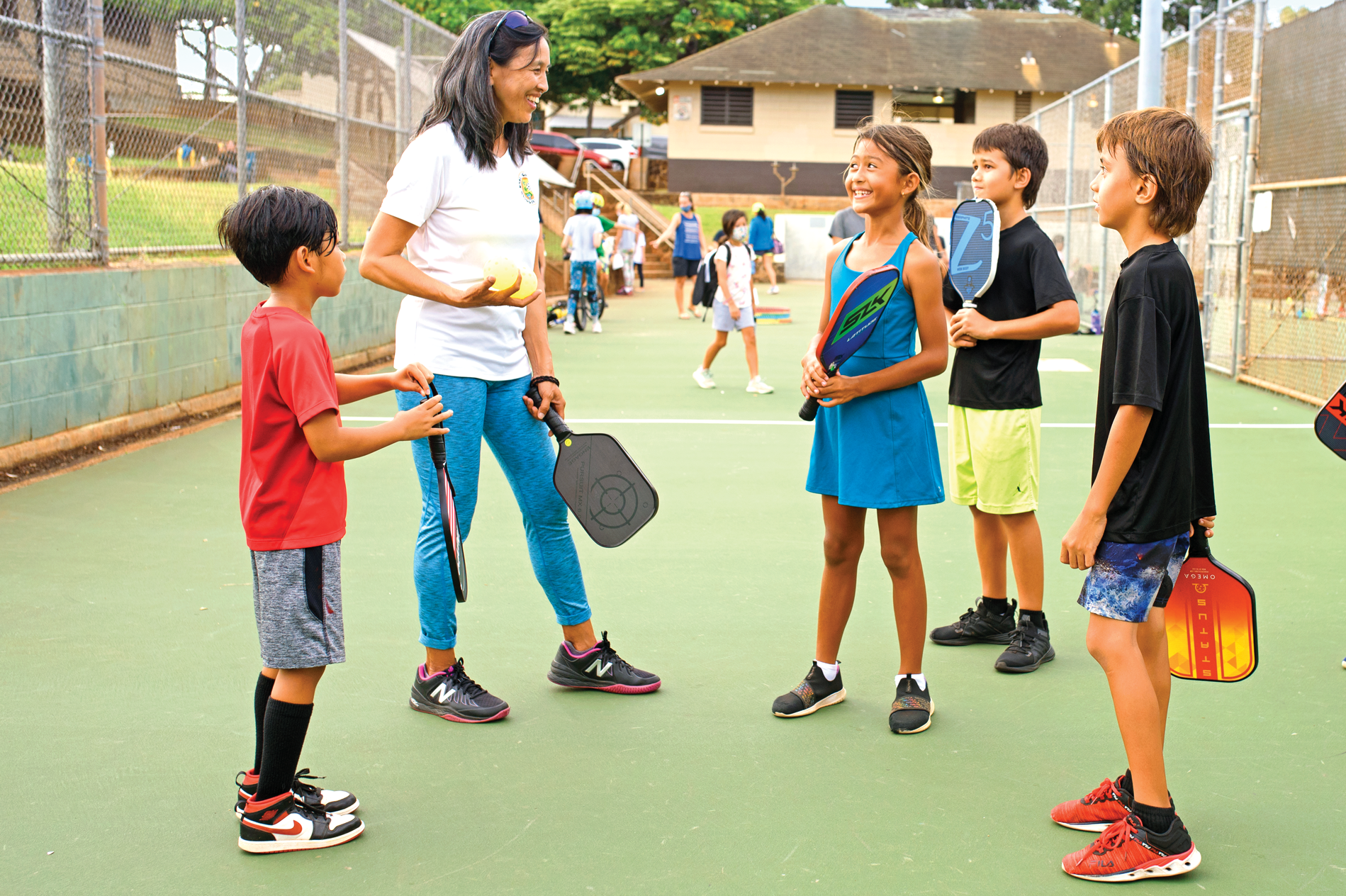
“I think Kevin and I played for four hours straight that first time,” she recalls. “I wish I knew the name of the woman who was so kind and volunteered to teach us that day. She kept lining up other people to play with us, too.” Ching then promptly purchased a paddle in the pro shop to bring home to Hawaii.
Asked what made her such a quick convert to pickleball, Ching says, “It was the immediate gratification. It is so pleasurable. You don’t have to be a body type. It is not necessary to be lean. You don’t have to have played dynamic sports to play it. It is a game changer.” It was also a sport she could play with her husband. “We had not played tennis together in years, as his game is faster than mine,” she says. “Pickleball put a new spark in our marriage, as we started traveling and playing together.”
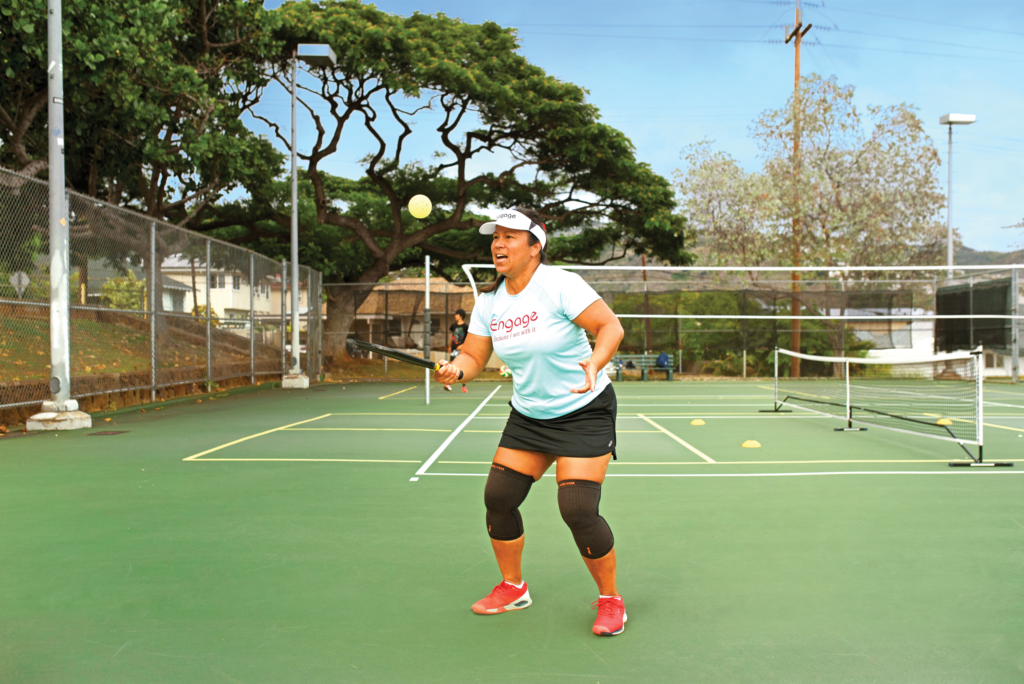
It also gave Ching, who grew up in the San Francisco Bay Area of California as the daughter of Chinese-American parents, a new lease on life in Hawaii, where her father was born and raised. Her career in technology, which included a decade working in San Francisco at Hewlett-Packard, ultimately brought her in 2001 to Hawaii, where she has since used her skills in various roles at a number of organizations, including nonprofits. In 2017, soon after learning to play pickleball, she started the nonprofit Oahu Pickleball Association and organized drop-in play sessions while also creating a Facebook group and an Instagram account.
Though there were no dedicated pickleball courts in the vicinity, Ching did find a paddle tennis court that could be converted, as well as some parks with volleyball courts where they could tape down lines and bring portable nets. Five months after starting OPA, Ching launched a youth program. It could never have happened without the support of the city and county of Honolulu’s Department of Parks and Recreation, which issues permits for public courts. “That partnership was essential to making it happen,” she says, adding that staff from Parks and Recreation also teach kids pickleball through a department program.
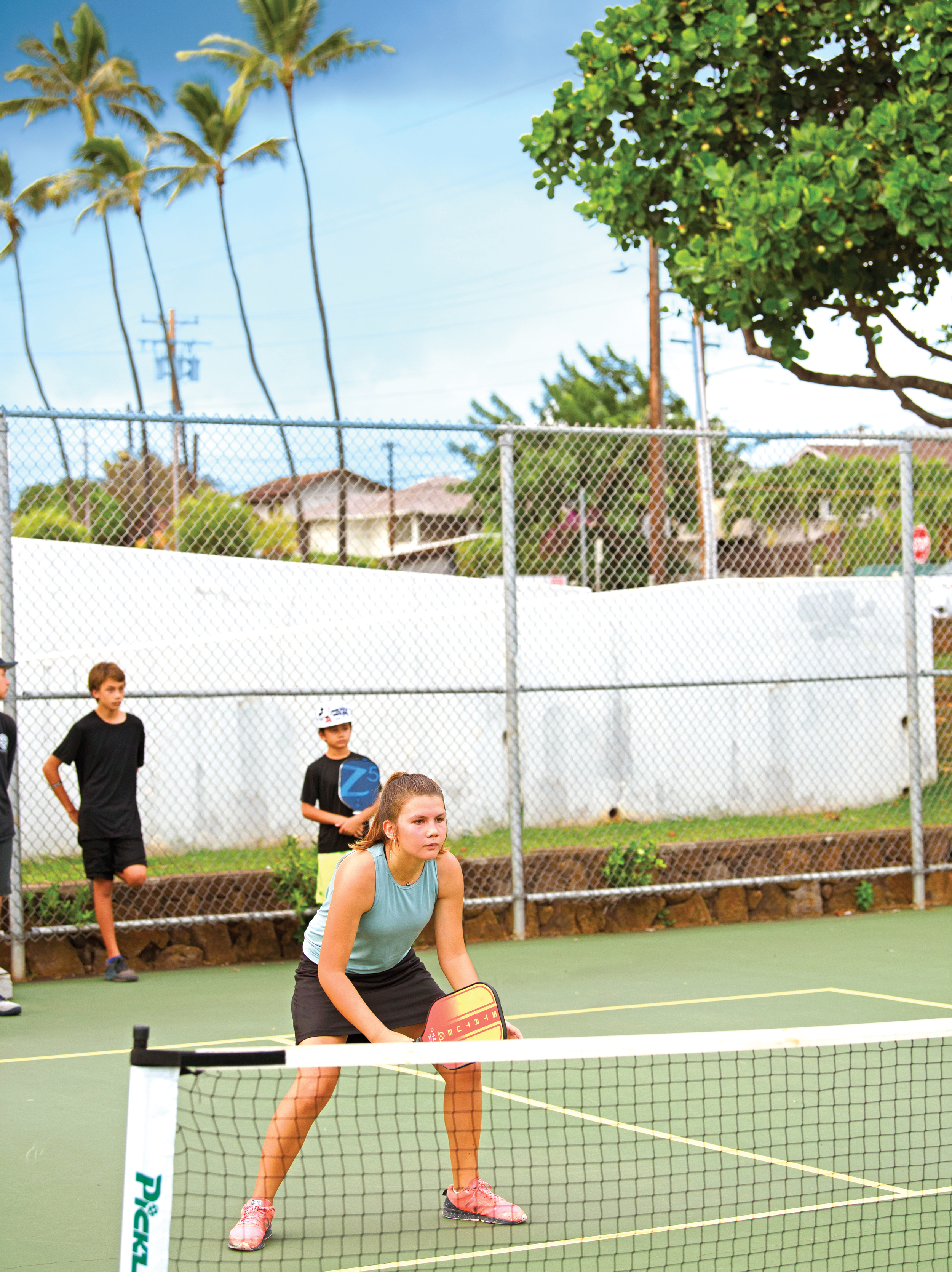
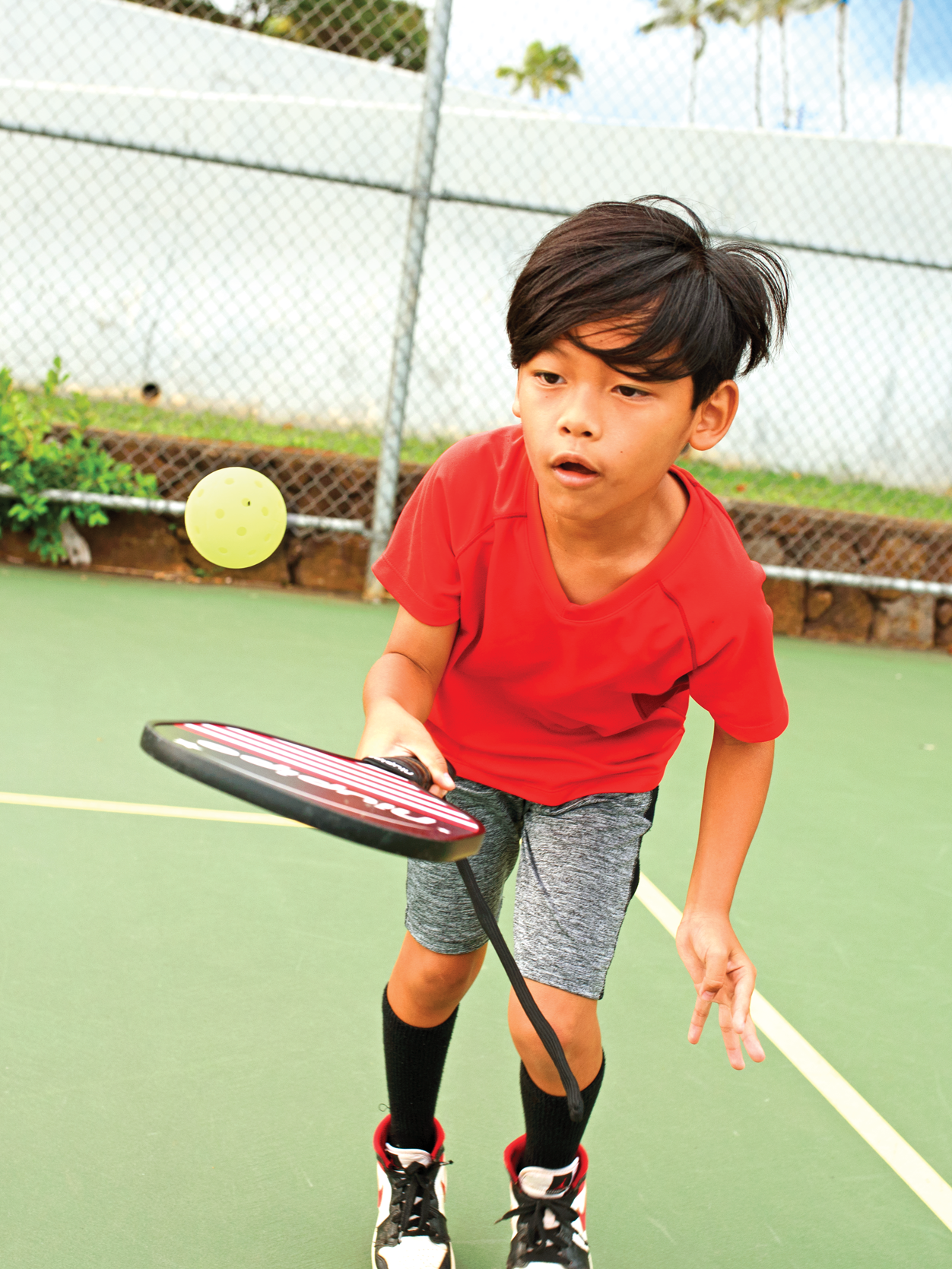
Ching began by offering introductory lessons to kids aged 6 to 12 years old at two parks in the area. However, upon realizing that the youngest needed more instructors (which she did not have), she changed the age requirement to 8 to 18, separating the younger and older children so they would be among their peers for a better play and social experience. “I felt like kids nowadays are just so over scheduled with academics and competitive sports, I just wanted them to get out and have fun, like I used to do with my five siblings. You just put that wonderful paddle and ball in a kid’s hand, and before you know it they can teach each other, and play with their parents without any shortcuts,” she says, admitting that even she overprogrammed her only daughter, now in her 30s, when she was a child. “I was guilty of doing it too.”
To further benefit the program, in 2019 Ching became certified to teach with the Professional Pickleball Registry and in 2021 the International Federation of Pickleball.
Ching also wanted her program to be accessible to people of all income levels and all children and teens. “We have made it extremely affordable, and if anyone needs financial assistance, we offer that too,” she says. Though the Parks and Rec program had to stop in March 2020 because of Covid, in January 2021 Ching started the program back up on her own via the Oahu Pickleball Association with the help of fellow IFP instructor Elaina Paredes.
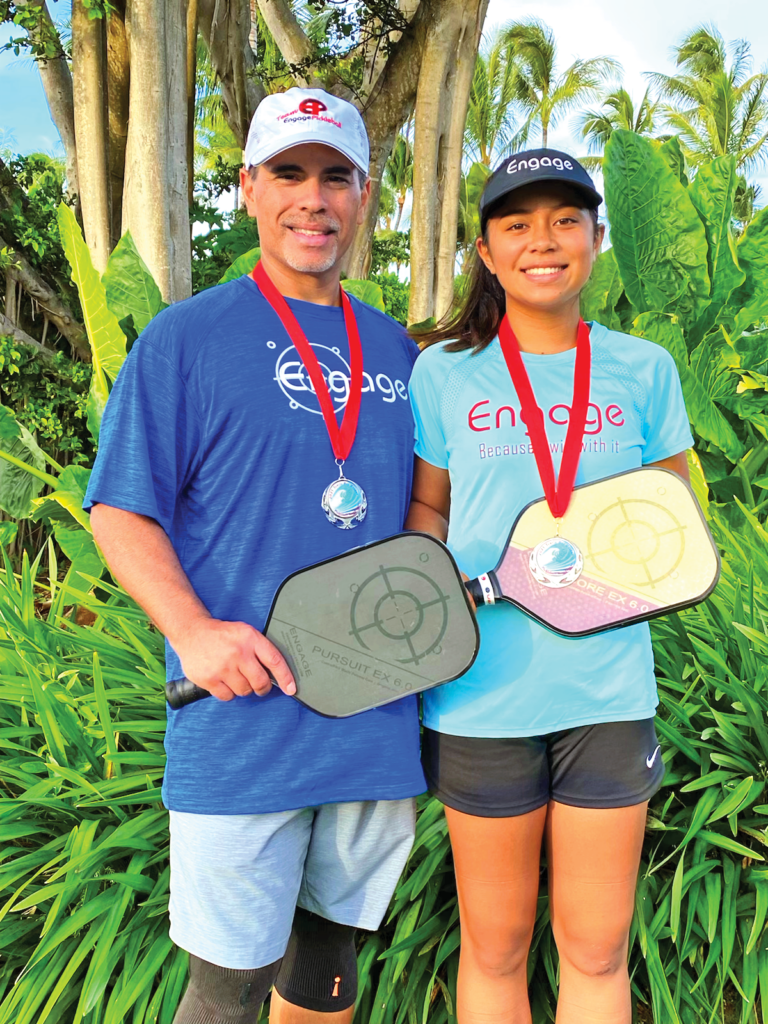
In fact, Ching was one of the people who taught Paredes to play. When Paredes and her husband gave her and their daughter, Kylena (then 10 years old), paddles for Christmas in 2017, mom and daughter could not wait to get out and play.
“We went to a drop-in play on the public courts in January 2018 and were such newbies to the sport, but everyone was so nice to us, including Donna,” recalls Paredes, 48, a native Hawaiian who had coached soccer for 20 years and admits to having “a great passion for teaching kids.” This past year Ching asked Paredes if she might like to teach kids pickleball, and Paredes agreed.
Now Paredes teaches a dozen kids at two nearby courts twice a week. “I think it opens the children’s eyes to a new user-friendly sport. The equipment is light enough even for young children to play. They are not on phones or playing video games but breathing fresh air and meeting other kids. They also can play with their families on the weekends,” Paredes says.
She should know. Paredes and her daughter, now 14, are a successful women’s doubles team. In November 2021 on Oahu, the two earned a gold medal in the 4.0 level of the first annual Turtle Bay Resort Pickleball Tournament for players 12 and up. Kylena also helped her father, Kyle, 48, win a silver medal, playing mixed doubles with him in the tournament’s 4.5 level.
“What motivates me is how empowering pickleball is for kids,” says Ching. “It’s an equalizer.”
Kylena, who also plays soccer, says she became serious about the sport during Covid, when it was one of the few activities she could do safely. She played her first tournament in January 2020 at the Hawaii Open alongside a 13-year-old boy. “He is from Canada, so that was really cool,” she says.
Now Kylena has introduced her soccer friends to the sport. “We laugh a lot while playing. It’s fun even when you mess up on the court,” she says. But when it comes to training, Kylena plays with the adults. “For me, being a younger person and more advanced, I play a lot with my parents and their friends, and I love it,” she says, admitting that she has not ruled out playing professionally one day.
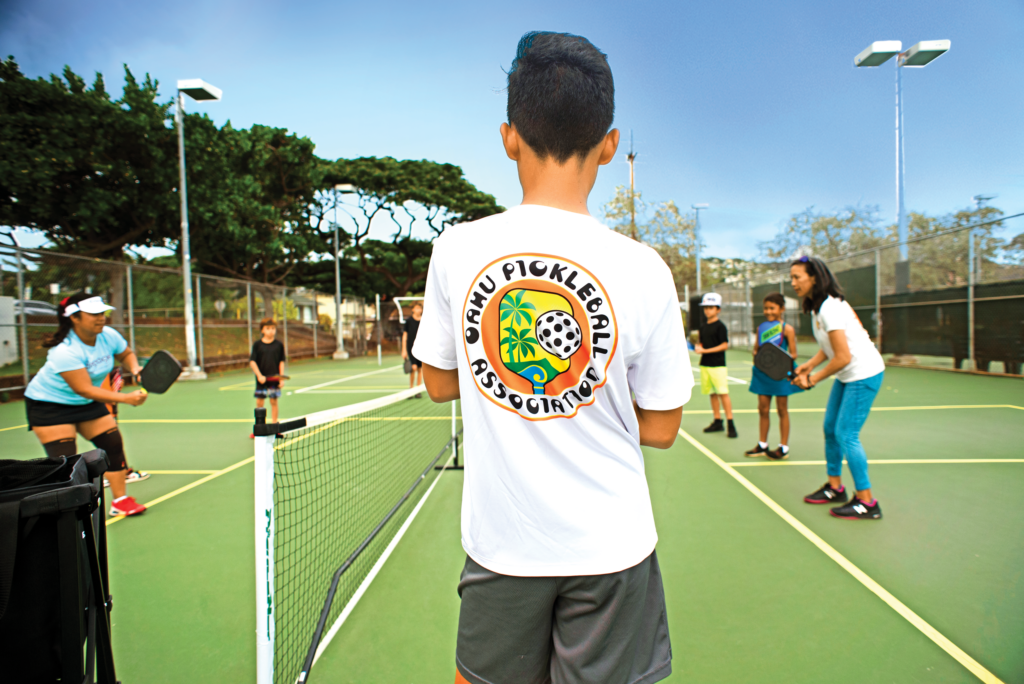
FOR NOW, Ching and Paredes, who sits on OPA’s board, have high hopes for continuing to develop the sport among youth in Hawaii. Paredes is working to have physical education teachers in Oahu’s public schools teach pickleball as a scholastic sport. (For the moment, some public schools teach the sport but not as part of the curriculum.)
“I would like to see kids getting pickleball scholarships to college one day,” says Paredes, who dreams of the sport being picked up by college athletics. The two women are also trying to have youth events included in the upcoming 2022 Hawaii Pacific Rim Pickleball Cup.
“We would love to see kids from other countries come and play in that tournament while their parents are playing in the tournament,” Paredes says. But they are also working to get more dedicated pickleball courts in Hawaii, particularly as they now see the kids who complete their junior program regularly playing with family and friends, making the demand for courts even higher. Or as Ching says, the aloha factor behind pickleball is making it a celebrated rising sport in Hawaii.

